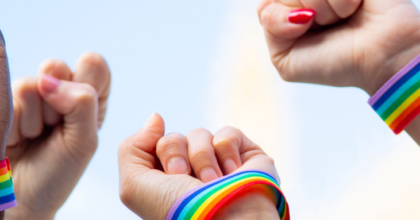Gender spectrum mainstreams: 46% of Americans view gender as a spectrum
- Nearly one in five Americans say they personally know someone who identifies as non-binary.
- 29% have felt personally limited by gender norms and stereotypes.
- 51% of consumers say they like seeing brands explore gender bending.
- Only 17% are aware of diversity training on gender identity and gender expression offered by their employer.
More Americans are coming to accept the gender spectrum model which includes a range of gender identities and expressions, according to new research from Mintel, the experts in what consumers want and why. Today, nearly half (46%) of Americans view gender as a spectrum rather than as a traditional binary model, rising to 53% of Generation Z (aged 13 – 25) and 68% of LGBTQ+* consumers. What’s more, nearly one in five Americans say they personally know someone who uses gender-neutral pronouns (18%), increasing to 32% of Gen Z and 35% of LGBTQ+ consumers.
The vast majority (67%) of Americans, regardless of whether they identify as transgender**, non-binary***, or cisgender****, consider their gender to be a crucial part of their identity. However, 29% of Americans have felt personally limited by gender norms and stereotypes, rising to half (49%) of LGBQT+ consumers.
While gender-based stereotypes still exist in America, 56% of Americans believe eliminating gender norms and stereotypes is good for society.
Lisa Dubina, Senior Analyst, said:
“While the majority of Americans personally identify as male or female, more people are coming to accept the gender spectrum model that supports fluid and non-binary gender identification. While gender-expansive identities remain a minority, they are most common among Gen Z and LGBTQ+ adults. The widespread awareness and acceptance among these segments indicate that this shift in the concept of gender is an enduring change rather than a fleeting fad. As the gender spectrum paradigm continues to become more mainstream, brands must understand this framework and how it impacts the gender identity and expression of all consumers.”
Gender-neutral and gender-fluid products gain widespread appeal
Mintel research highlights the growing attention and appeal for gender-neutral and gender-fluid products. Nearly a third (31%) of consumers say they like to experiment with personal care products created for different genders, rising to over half of (52%) Millennials (aged 26 and 43). Meanwhile, a quarter (24%) of Americans do not like to use products designed specifically for their gender.
Although less than two in five (37%) consumers say they would be interested in buying gender-neutral clothes for themselves, over half (53%) of parents say they would be interested in gender-neutral clothing for their children. This comes as just over half (51%) of consumers say they like – rather than dislike – seeing brands explore gender bending, a sentiment that jumps to 74% among LGBTQ+ consumers.
“Brands have an opportunity to expand upon the gender-neutral product offerings currently available. Many brands have dabbled in gender-neutral clothing lines or collections, including Banana Republic, Converse, and PacSun. However, many of these efforts tend to lean toward traditional masculine clothing items in neutral color schemes and brands continue to equate gender-neutral clothing with bland and basic ensembles. Given the growing interest in gender bending among both LGBTQ+ consumers and the general population, brands should explore genderless lines that celebrate the fluidity of gender,” adds Dubina.
Workplace training on gender-expansive identities is lacking and desired
Finally, despite the growing incidence of gender-expansive identities, it seems very few people (17%) are aware of diversity training on gender identity and gender expression offered by their employer. Mintel highlights a real need for education, as two in five (38%) Americans say they feel uncomfortable when they are not sure of someone’s gender.
Despite the general lack of formal training, gender-expansive inclusivity is not absent within all work situations, as 59% of LGBTQ+ adults say their place of work has made noticeable efforts to be more inclusive towards transgender and non-binary people. However, two in five (39%) of transgender adults admit they are not comfortable fully expressing their gender identity at work, indicating that intolerance is felt and experienced.
“The fear, discomfort, and lack of uniform practices surrounding workplace training on gender-expansive identities demonstrate that more education and training is critical. Brands would be remiss not to begin exploring the ways in which they can make their offices more knowledgeable, equipped, and inclusive when it comes to gender-expansive identities – for the betterment of their employees and company culture, but also for the relationship they build with consumers,” concludes Lisa.
*For the purposes of this research, Mintel defines LGBTQ+ as Lesbian, Gay, Bisexual, Transgender, Queer
**Transgender: An umbrella term for people whose gender identity and/or expression is different from cultural expectations based on the sex they were assigned at birth. Being transgender does not imply any specific sexual orientation. Therefore, transgender people may identify as straight, gay, lesbian, bisexual, etc.
***Non-binary: An umbrella term that refers to individuals who identify as neither man or woman, or as a combination of man or woman. Instead, non-binary people exhibit a boundless range of identities that can exist beyond a spectrum between male and female.
****Cisgender: Describes a person whose gender identity aligns with the sex assigned to them at birth.
For the latest in consumer and industry news, top trends and market perspectives, stay tuned to Mintel News featuring commentary from Mintel’s team of global category analysts.
-
Discover your next big breakthroughGet smart fast with our exclusive market research reports, delivering the latest data, innovation, trends and strategic recommendations....View Reports
-
2026 Global PredictionsOur Predictions go beyond traditional trend analysis. Download to get the predictive intelligence and strategic framework to shape the future of your industry in 2026 and beyond. ...Download now
-
Are you after more tailored solutions to help drive Consumer Demand, Market Expansion or Innovation Strategy?Ask for a customised strategic solution from Mintel Consulting today....Find out more































